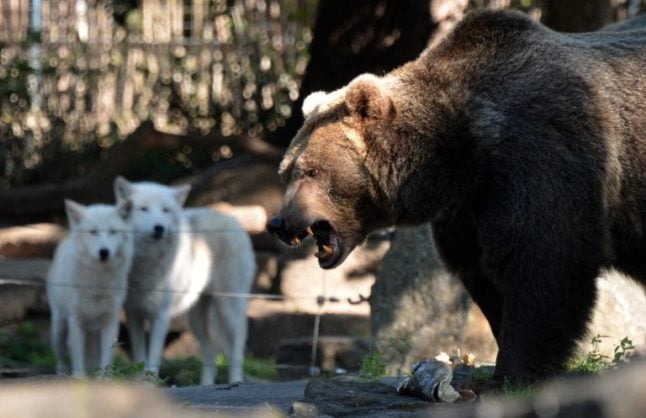Inspired by a reader question to our sister site, The Local France, we decided to find out how many bears and wolves currently live within Germany’s borders, and whether they are a threat to those using Germany’s natural spaces.
Bears: Gone, but not forgotten
The odds of anyone seeing a bear in Germany are staggeringly low.
While around 17,000 brown bears – the species found in Europe – still live free, almost all of these can be found in the wilder, more inaccessible areas of the Balkans, the Carpathians and Scandinavia.
Brown bear populations across central and Eastern Europe were nearly wiped out as human populations grew throughout the Middle Ages, with those able to escape making a home in the deep forests.
As towns and cities in today’s Germany underwent a massive transformation in the eighteenth and nineteenth centuries, requiring lumber and other resources, these remaining populations were finally hunted to extinction.
It is believed that the last bear killed in Germany was shot at Ruhpolding, in Lower Bavaria in 1835.
That’s not to say that there haven’t been reappearances.
In 2006, ‘Bruno’, also known as ‘The Problem Bear’ is thought to have wandered across the border from Austria and began killing sheep and other livestock.
Despite public protests – and many attempts to capture him using non-lethal methods, he was shot dead at the Rotwand, 70km south of Munich, as there were fears he could attack humans.
READ ALSO: Bruno the bear on display in Munich
Evidence of another bear, in the form of dung, trailcam photos and footprints, surfaced in 2019.
It is thought that after hibernating in the area of Garmisch-Partenkirchen, this bear returned to existing populations in Italy’s Trentino region, seeking a mate.
Wolves: Making a comeback
You’re also incredibly unlikely to encounter a wolf in Germany.
Much like their bear cousins, wolves were hunted to extinction within the borders of today’s Germany, as they posed a very real-threat to livestock populations and foresters.
While the ‘Tiger of Sabrodt’, shot in 1904 near Hoyerswerda in Saxony, was considered the last wolf killed in Germany, there hadn’t been substantive evidence of a wolf pack discovered since 1850, near Brandenburg.
However, unlike bears, wolves have reappeared and established populations in Germany, thanks to concerted and coordinated conservation efforts across many European countries.
According the latest figures from the Federal Documentation and Consultation Centre on Wolves, there are now 161 recorded wolf packs settled in Germany, distributed mostly in the less-populated states in the north and east of the country.
The Federal Agency for Nature Conservation estimates the total number of wolves to be around 1,175.
READ ALSO: ‘Germany’s most politicized animal’: How wild wolves are causing a stir
This has led to some debate, as farmers are still concerned about livestock losses – particularly in Bavaria, where State Premier Markus Söder has made it a campaign issue in an appeal to his rural base.
However, most wolf populations are highly reclusive and have not strayed near major population centres in Germany.
So far, so good?
As emphasised, you are very, very unlikely to encounter a wolf in the German outdoors. The chances you’ll encounter a bear in Germany are close to zero.
Both are very shy animals, and will not attack humans unless they feel that they or their young are directly threatened.
That said, you can make sure your next woodland ramble isn’t interrupted by staying on clearly signposted trails, avoiding nighttime walks and ensuring that any food you bring in with you is tightly sealed and that odours can’t escape.
If you do find yourself face to face with a large carnivore, Finnish website, largecarnivores.fi, has advice on what to do – back away and don’t break eye contact.




 Please whitelist us to continue reading.
Please whitelist us to continue reading.
Member comments